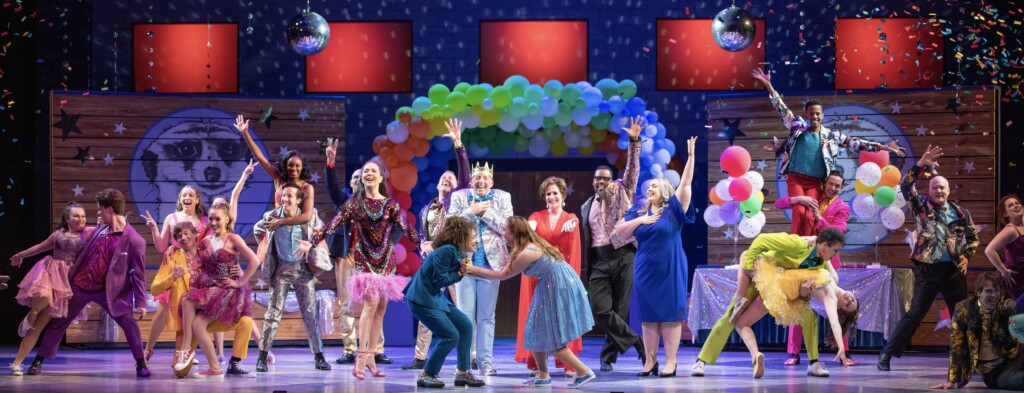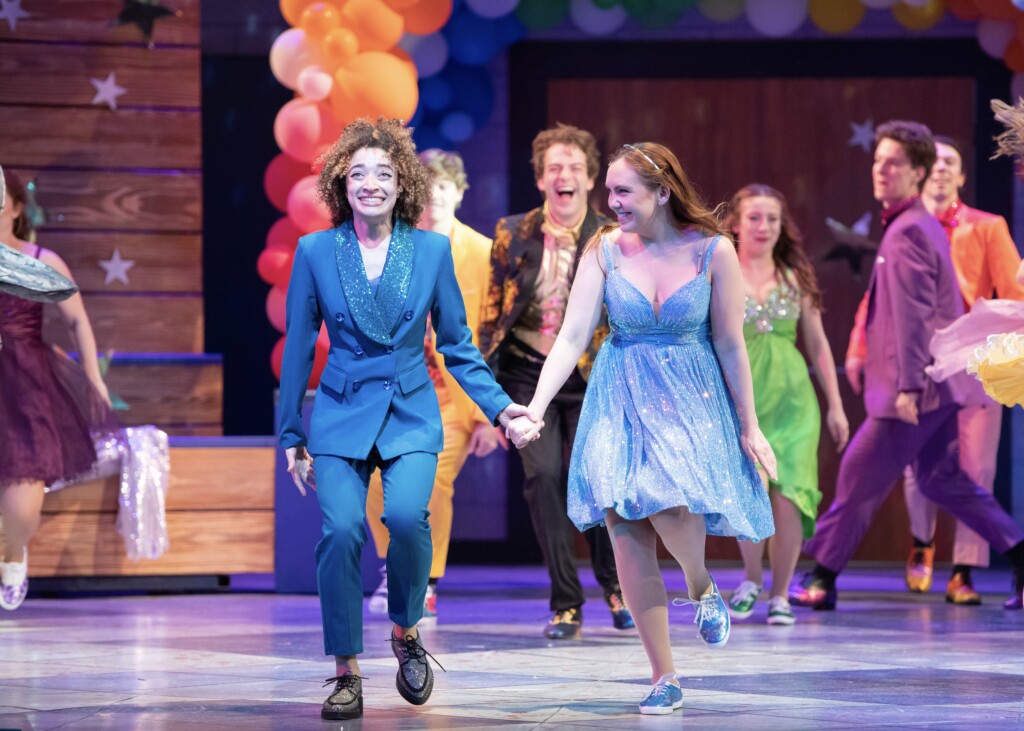Sometimes, a feel-good musical comedy reminds us that the ideal of everyone dancing together at a concert, festival or school prom has not yet fully materialized. In Hairspray, segregation is the barrier but Tracy Turnblad’s bountiful optimism in hoping that everyone of all identities can dance on The Corny Collins Show prevails.
In The Prom, Emma is a lesbian who cannot attend her high school prom because she wants to bring her girlfriend, who fears what her mother will do if her identity is made public. Emma, on the other hand, is secure and adjusted in her identity, taking to social media to spread awareness about her predicament. To her surprise, it goes viral in the most unexpected way.
As serious as that premise seems in framing the story, The Prom comes very close to doing as well as Hairspray, in spreading its message about social freedom and the rights that accompany it. And, as with Hairspray, The Prom proves that musical comedies are irrepressible. The show transports its uplifting oomph through high-octane choreography, charming ballads and a rapid-paced stream of hilarious satire. Indeed, its creators already had amassed successful portfolios in musical comedy and parody: Chad Beguelin (book and lyrics), Bob Martin (book) and Matthew Sklar (music). The show was first produced in 2016 and had its Broadway premiere in 2018.

In an Utah premiere perfectly timed to prime the palate for Pride Month in June, the Pioneer Theatre Company’s (PTC) production of The Prom is a rollicking exhibition of theatrical gymnastics worthy of a gold medal. The show, which closes a most memorable season for the company, continues through May 27.
Directed by Karen Azenberg, the production’s cast and ensemble extract all of the show’s best creative assets. The excellent cast is supported by an equally fine pit orchestra, directed by Phil Reno, and a dynamite choreographic team which includes Azenberg, J.P. Qualters, Lenny Daniel and Ella Samira Murphy.
The musical comedy, embedded with plenty of classic tropes representing its genre, sprints fast out of the gate. The triumph of opening night for Broadway actors Dee Dee Allen (Anne Tolpegin) and Barry Glickman (Branch Woodman) is shattered, after their frustrated publicist reads a scathing pan from The New York Times of their show, a musical based on the life of Eleanor Roosevelt. The critic suggests death is more appealing than watching a show that tries to replicate Hamilton’s success with its own hip-hop take. Furthermore, the critic targets Dee Dee and Barry as despised human beings.

Photo Credit: BW Productions.
Sheldon (Howard Kaye), the publicist who is exasperated by his self-absorbed clients, says the only way they could rehabilitate their image would be to become humanitarians. Unfortunately, these preening divas are not yet prepared to give up their addiction to narcissism. They include Angie (Wendy Waring), who has been forever sentenced to life stuck in the chorus line for Chicago, and Trent (Josh Adamson), a Juilliard trained waiter-actor has-been whose only recognizable claim to fame came from the 1990s sitcom Talk to the Hand.
This exhibitionistic quartet scours social media for potential humanitarian targets. They notice the posts by Emma (Celeste Rose) about how her small town high school in Indiana will not let her bring her girlfriend to the prom. Incidentally, Jack Viertel, Broadway producer, conceived the idea for The Prom, after seeing news about a 2010 incident where a senior at Itawamba Agricultural High School in Fulton, Mississippi, like Emma, was not allowed to bring her girlfriend to the prom. Numerous celebrities including Green Day, Lance Bass and celebrity chef Cat Cora, among others, led efforts to sponsor a ‘second chance’ prom for the young Mississippi couple. The Prom broadly captures the gist and spirit of those events in the musical’s storyline.

Pioneer Theatre Company. Photo Credit: BW Productions.
In the show, the four actors are giddy about grabbing onto the subject of homophobia as their gateway to salvaging their battered public image. With Sheldon in tow, they catch a ride on the touring convoy for Godspell to the heart of Indiana. In a hilarious reprise of Changing Lives, Barry proclaims, “We’re gonna help that little lesbian whether she likes it or not … We’re going down to where the necks are red/ and lack of dentistry thrives/ why sing and dance when you can take a stance.”
This could have been a risky storyline move, but as with the team behind Hairspray, The Prom’s creative team handled it well. They established the right configuration to secure the serious epiphany of Emma’s issue while leavening it with enough belly-busting comedy to not let it be bogged down by excessive sentimentality.
The PTC cast sails through these tricky maneuvers perfectly. The lion’s share of the comedy is devoted to the quartet of meddling Broadway celebrities who have barged their way into small town Indiana, without an invite. Meanwhile, Emma’s character is safe from satire, except for references to her wardrobe tastes, which the über-flamboyant Barry hopes to fix. In fact, the only Indiana characters we get any clear picture of are Alyssa (Mia Cherise Hall), Emma’s girlfriend; her mother, Mrs. Greene (Erin Wilson), the PTA president who is unaware of her daughter’s identity; Mr. Hawkins (Bernard Dotson), the principal who supports Emma and surprises Dee Dee with the fact that he adores her performances, and a few other students (Lila Prince, Kennedy Perez, Evan Latta and Weston Wright).

Pioneer Theatre Company. Photo Credit: BW Productions.
Along with gobsmacking displays of ballad vocals by the leads, the ensemble of Indiana student characters delivers balls of fire in the show’s big dance numbers. The ballads are pleasantly written musically, but Rose’s performance, in particular, as Celeste elicits the valuable context from their solid lyrics. For example, in Dance with You, she sings, “I don’t want to be a scapegoat/For people to oppose/ What I want is simple/As far as wanting goes/I just wanna dance with you.” Likewise, in Unruly Heart, the takeaway is just as clear, as Emma has second thoughts about the public spectacle which has erupted: “I tried to change/Thinking how easy life could be/I just kept on failing/ I guess that was a sign/That there wasn’t much hope/For this unruly heart of mine.”
Meanwhile, the outstanding Zazz, set for Emma and Angie with its hat tip to the Bob Fosse legacy, sets the second act’s fast-paced rhythm toward its exuberant brightly colored finale. With lines like “But when scared or on the fence/You’ll find that zazz will soon make fear/Become your bitch,” the anthem of Zazz would be welcomed by any student in any American high school who contends with the circumstances that Emma endures.
And, like so many other musical comedies that have become part of the Americana pantheon, The Prom deserves its place in this cultural library. Certainly, PTC’s production puts the proper exclamation point on its behalf.
For tickets and more information, see the Pioneer Theatre Company website.

3 thoughts on “Delivering all the ‘zazz,’ Pioneer Theatre Company’s Utah premiere of The Prom is rollicking exhibition of gold medal theatrical gymnastics”